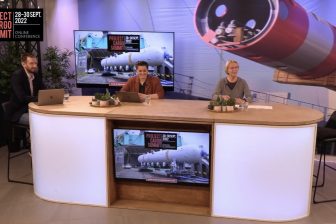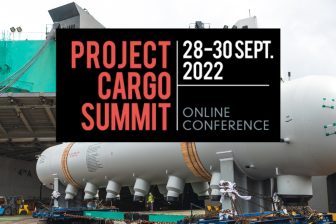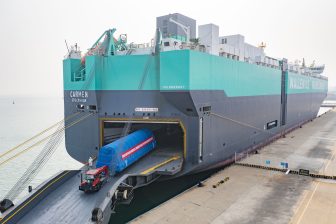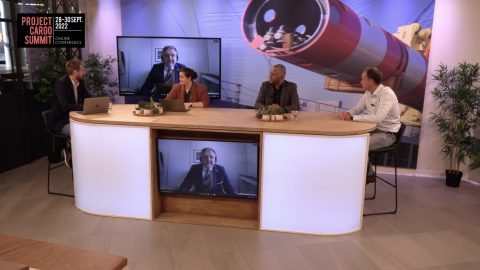
PCS 2022: Day 1 morning session highlights
The first day of Project Cargo Summit has come to a close. Broadcasted from the Promedia Group studios in Rotterdam, guest speakers were able to join both physically and via video conference, to discuss this year’s topic of ‘project cargo in the midst of the energy transition.’
Rotterdam: Gateway to Europe
The opening of this fifth edition of the Project Cargo Summit (PCS) was hosted by the editor-in-chief of Project Cargo Journal Adnan Bajìc, who first welcomed Danny Levenswaard, Director of Breakbulk at the Port of Rotterdam Authority. This is the fifth consecutive year that the Port of Rotterdam has partnered with PCS. Indeed, in addition to being home to the Promedia studio, the Port of Rotterdam is Europe’s largest port, and a significant player in the project cargo and breakbulk market.
Danny Levenswaard commented: “what we notice as a port authority, is that the parties operating in the project cargo segment see more and more opportunities coming from this energy transition, especially the Rotterdam community.” He stresses that “the heavy lift and project cargo segment is a very important one for Rotterdam,” but also the European industry as a whole. “I think it’s also good that you are bringing together in this rapidly changing world all the people from the project cargo sector, to inform each other about the latest developments, and learn from each other. We’d like to see Rotterdam not just as a logistics hub but also as a place that provides a platform for the exchange of information.”
It is in this spirit that PCS welcomed its first guest, Lucia van Geuns, from the Hague Centre for Strategic Studies, to discuss the geopolitical challenges shaping the energy market today. Indeed, Albert Einstein is quoted by Forbes as having said, “If I had an hour to solve a problem I’d spend 55 minutes thinking about the problem and five minutes thinking about solutions.”
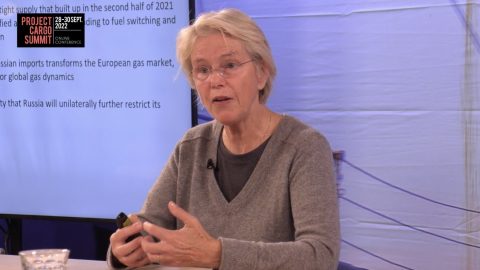
Geopolitical challenges in Energy today
Lucia van Geuns gave a presentation covering the global energy context, the current energy crisis and the new geopolitical landscape that has devolved from Russia’s invasion of Ukraine. Good energy policy must be sustainable, secure, and affordable, but “in the last few years, especially in Europe, the emphasis on sustainability has been very high,” she explains. Today, however, affordability and security have become a much more salient issue. “A new age of energy insecurity occurred with the war started by Russia.” she posits. Currently, “The US is the new energy power, while China remains heavily reliant on imports.” These developments are heralding a new energy order. However, “the transition will not be smooth and orderly,” warns van Geuns.
The global power market is also in a volatile state, as renewables gain market share and governments step up decarbonization policies to boost energy security and cut emissions. “What we see is that the world’s energy security is about to be transformed, but energy insecurity is likely to be here to stay.” Overall, the speed and success of the energy transition therefore will depend on policy choices, international relations, technological breakthroughs, and infrastructure development.
Looming insufficiencies in the global MPP vessel fleet
Yorck Niclas Prehm, Head of Research at Toepfer Transport, brought to the fore the core issue of insufficient tonnage availability relative to demand in the project cargo sector. Multipurpose (MPP) vessels currently represent only 2,3% of vessels, 20% of which are expected to leave the market in the next 5 to 10 years. Essentially, the global fleet shrank and is also ageing.
“The next step would be ordering newbuilding,” says Prehm, which comes with its own share of challenges. There we see some difficulties in terms of pricing, rate stability and also with the availability of newbuilding slots.” Indeed, “building an MPP is technically more complicated.” Geopolitical issues and uncertainties come into play, as China plays a massive role in the MPP vessel-building industry. Viable alternative newbuilding hubs might include Indonesia, India, and Vietnam, as most European yards struggle to be competitive in the MPP building sector.
At the moment, MPP Charter rates are going up, and prices are now going down, but are still at a record high. Prehm suggests that the rate levels will remain high and that this is now a market correction. Crucially, the rates have to remain high due to the urgent need for fleet renewal, which will be costly. Overall, “Everyone is looking for solutions and the key solution is vessel space. We need vessel space, modern and economic vessel space.” concludes Prehm.
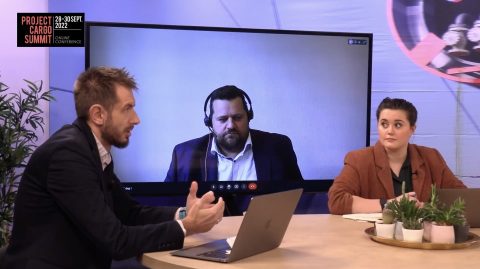
The role of ports in the energy transition
Danny Levenswaard, Director Breakbulk at Port of Rotterdam, Daan Van Velzen Commercial Manager Logistics, for Team Cargo at the Port of Amsterdam, and Jesper Bank, Chief Commercial Officer at Port Esbjerg, sat down for a panel discussion on the role ports can play in the energy transition.
In the Danish port, there has been an increase in offshore wind (OW) industry cargo overall, despite hiccups in the supply chain and a lack of affordable steel. However, Bank stated that ”looking forward, we get sweaty. From 2023 on, things will really begin to speed up.” In the Port of Rotterdam, “increasingly large projects require more space and stronger infrastructure.” comments Levenswaard. Indeed “Everything is still sizing up, not just the turbines or tower sections but also the vessels, the trucks,” says Bank.
Ports may also need to devise new infrastructures to share power and resources. For the Port of Amsterdam, “It’s a move from being a fossil port to a non-fossil port,” explains Daan Van Velzen. Working with companies towards mutually beneficial solutions will be necessary. Port companies can focus on new fuels or hydrogen. “We’re working on a bio-park in our port,” says Van Velzen. But in a context where new industries need to be developed as the old are phased out in the same environment, space becomes a pervasive problem. This is particularly true in ports like Amsterdam which are confined in their growth by urban areas.
To conclude, Bank stated, “We want to be a port on the forefront. We take these investments with the risks and even sometimes with the losses because we know that in five years, ten years, you need to be there.” Levenswaard concurred: “Ports need to make sure the infrastructure is there: having CO2 or hydrogen pipelines, space for wind farm components, but also to attract companies that are frontrunners in the energy transition…” Indeed, the pace of developments in the offshore wind sector is outpacing those ports. “The ambitions are much higher. We are driving on a bike path when what we need is a freeway.”

